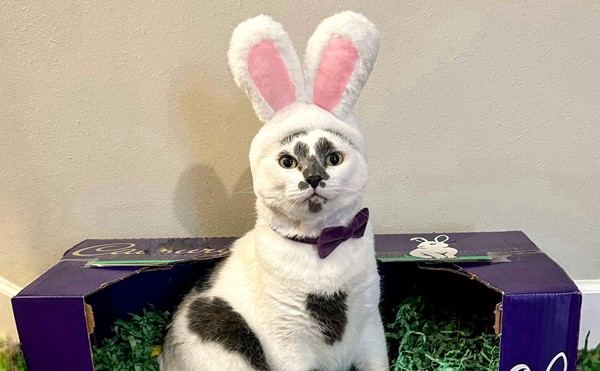"I don't really consider myself a slam poet," Imani says. "I'm a poet, but slam is not where my heart is. For me, poetry is a form of self-expression. Everything I write has a message, which I use to influence people. Slam is just another medium to do that." Of course, it also has the name, and some of the spirit, of in-your-face basketball, which we had previously thought to be far from poetry. "I do have a problem with the competitive edge in the slam scene," Imani says in response to this paradox.
Though she considers herself an artist first (besides her poetry, she makes paintings), Imani has a day job, and it's certainly not about competitive edge: She is a professional childbirth assistant. She has some personal experience in this field from the other side of the table, having given birth to four children (and by the age of 28!). Her most recent child, a daughter, was born just three days after Imani took first place in the final round of competition for the St. Louis team that will attend the national slam. "Her name is Selah," says the mother of the newborn, "a Hebrew word of power and intent, like 'amen.' So she's sort of spoken-word manifested."
Imani's presence on the slam scene is not entirely about power and intent and self-expression, though, which makes for a good story. "I heard there was a $100 prize for a poetry reading," she remembers of her first slam, last year at Afrocentric Books. "I needed to pay my electric bill, so I entered. And I won! Since then, it has become a side job. When I need to pay a bill, I enter a poetry slam, and so far, I have won every time." If this sounds like a degradation of the art of poetry, then you don't know enough poets. Eric Pankey, a former St. Louis resident with eminently sound academic credentials (he directed the writers' program at Washington University), loved to talk about publishing in The New Yorker and buying a fridge with a single poem.
Pankey is the sort of contemporary poet who could be posited as the antithesis of the slam scene -- the old-school guy who writes and revises, producing verse that is textured with literary allusion, as if made to be footnoted, the sort of poet who "gives readings" that consist of standing at a lectern and reading from a written text. If there is any performing on the part of the poet, it's in attempting to act interested in the yawner questions posed by the audience in the obligatory Q&A that follows the reading.
Slam came along to demolish that, or at least scare it shitless, but Imani's example makes it clear that not all slam poets are chest-thumping, scatological, improvising attention-seekers. She writes her poems, as in down-on-paper-first, a process she deliberates over so intently that by the time a piece is finished, it is already committed to memory. "There is no long memorization process for me," she says blithely.
As an outgrowth of her slamming, though, she has experimented a bit with what she calls "freestyling," improvising at the microphone. And now, as a member of a bona fide slam team that will compete in a national contest with rounds of competition devoted to group performance, she has been called on to participate in her first collective composition.
The group-composition aspect of slam poetry might be new to Imani -- and to many poetry lovers when they first see a slam. People who are not rap fans are not much accustomed to seeing poets trading lines onstage the way jamming musicians do. But, in fact, collective improvisation in poetry predates the slam scene by a few centuries at least. Haiku, a poetry form familiar to most readers, has its roots in renga, or "linked verse," a centuries-old Japanese group-composition genre that could be thought of as samurai jazz poetry.
The typical renga was drenched with imagery of the seasons, cherry blossoms and that sort of thing -- a far cry from "I Got Yo Bitch," the first group composition in which Imani has a voice. The initial phrase that set the concept and mood (in renga, that would be the haiku) was established by St. Louis team member Dee Shante. "She came up with the framework," Imani says, "and then we all built on it, writing from our own experiences. We used all these different vibes and tried to come up with something good." Asked to summarize the piece, she becomes uncharacteristically tongue-tied and then finally says, "Come on out and check it out."
Should you like to take her up on that offer, go to Spruill's this Friday. Imani and Shante will be joined on the St. Louis team by Michael O'Brian, who performed with the last local team to go to the slam nationals in 1993, and Karim Hameed, a 15-year-old whose bio states that he "has been writing poetry seriously for six months" (which is a long time, I guess, when you are 15). Kevin McCameron of Intermission Magazine is the slam master who will situate our local talent in the field of traveling poets from the SlamAmerica tour. Those road/word warriors, organized by Gary Mex Glazner, will hit town as one stop on a 32-city tour that will wind up in Providence for the National Poetry Slam.
If you are otherwise engaged this Friday and can't make it to Rhode Island in August, look for the book Poetry Slam! The Competitive Art of Performance Poetry, available, along with plenty of other stuff, at www.poetryslam.com. Web-connected slam fans should also bookmark www.freshpoetry.com.
The SlamAmerica tour stops at 8 p.m. Friday, July 28, at Spruill's, 2625 Stoddard Ave. Call Intermission at 314-535-7370, ext. 2, or Spruill's at 314-533-8050.





